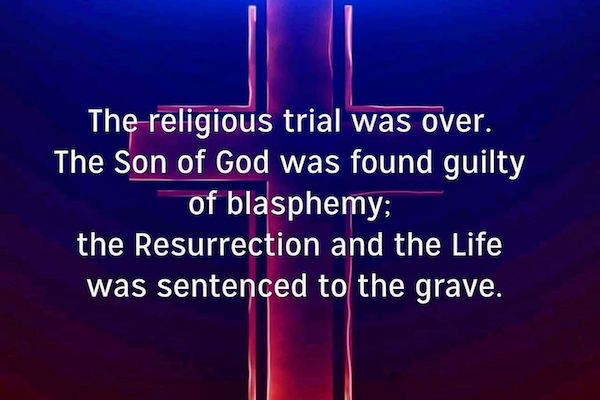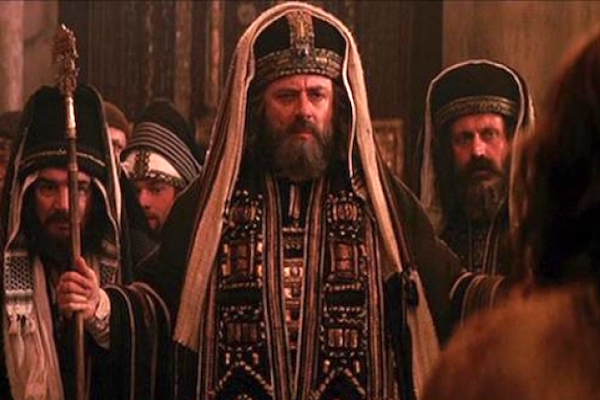LENT 2024: Day 24 - LIFE OF CHRIST

LENT 2024: DAY 24 - Tuesday March 12
“Our Blessed Lord had two natures: Divine and human. Both were on trial and on totally different charges. Thus was fulfilled the prophecy of Simeon that He was a “sign to be contradicted”. The judges could not agree as to why He should die; they could only agree that he must. The religious judges, Annas and Caiphas, found Him guilty of being too Divine; the political judges, Pilate and Herod, found Him guilty of being too human. Before the one, He was too unworldly; before the other, He was too worldly; before the one, He was too heavenly; before the other, too earthly… Condemned on contradictory charges, he was sentenced to the symbol of contradiction, which is the Cross.
Evil had its Hour, the Hour of which he had so often spoken. In that Hour, God gave to evil the power to affect a momentary triumph in which the spiritually blind would think they had gained a victory. The hands of the wicked are bound until God allows them to work, nor can they master a stroke one moment after God commands them to stop… In this Hour, darkness would have a power that would be powerless at the Resurrection.
The soldiers bound Him… Then they led Him off; He was not driven nor dragged because of His willing submission.
The route taken was across the brook of the Cedron, then through the “Sheep Gate” which was near the temple and through which the sacrificial animals passed. He was first led away to Annas, who was the father-in-law of Caiaphas, the high priest of that year… Inasmuch as both were representatives of religious power, the first trial was on the grounds of religion… From Annas, Christ was led to Caiaphas… It was the same Caiaphas who had said: “It was best to put one man to death, for the sake of the people.” (John 18:14)
It was thus evident that he and the Sanhedrin had resolved upon the death of Christ before the trial took place. A night trial of the Sanhedrin was illegal, but in the mad desire to do away with Christ, it was held nevertheless. Though it had no right to proceed to a capital execution, it did retain, however, the power to institute trials. As the trial began: “The high priest questions Jesus about His disciples, and about His teaching.” (John 18:19) Since Caiaphas had already determined that Our Lord should die, he had no intention of learning anything; rather he sought to find some excuse for the planned injustice. The first questions were about Christ’s organization and followers, whom the Sanhedrin feared as a threat to themselves… The judge was not so much concerned with the names of Christ’s followers as with their number; the purpose of this inquiry was to draw from Him an answer suited to their condemnation. The query about His doctrine was to discover is He was the head of a secret society or if He was preaching some novelty or heresy.
Our Lord saw the trickery behind the questions, and with absolute fearlessness born of innocence, answered: “I have spoken openly before the world; My teaching has been given in the synagogue and in the temple, where all the Jews forgather; nothing that I have said was said in secret. Why dost thou question Me? Ask those who listened to Me what My words were; they know well enough what I said.” (John 18:20-21) Christ spoke to the world, as well as to the Jews… Everyone knew what He taught. Caiaphas was only pretending to be ignorant of that which was common knowledge.
When Our Lord answered thus, one of the officers who stood nearby struck Him with the palm of his hand saying: “Is this how Thou makest answer to the High Priest?” (John 18:22)… It was the first blow struck against the Body of the Savior – a blow unreprimanded by the judges… Those who have not the capacity to criticize Christ resort to violence.
In all meekness, Our Blessed Lord answered him: “If there was harm in what I said, tell us what was harmful in it; if not why dost thou strike Me?” (John 18:23) With one breath, Our Lord might have hurled the offender into eternity, but since He was to be stricken for the transgressions of men and to be bruised for their iniquities, he would accept that first blow in patience.
Failing to convict Him out of His own mouth on either His doctrine or His disciples, and… anxious to put Him to death rather than to judge justly, they summoned false witnesses who contradicted one another… The false witnesses claimed that Jesus had said that He would destroy the temple; but what He actually had said was that they would destroy it and the temple would be His Body, which had just received a violent blow.
In his delivery into the hands of evil, Judas delivered Our Lord to the Jews, the Jews delivered Him to the Gentiles, and the Gentiles crucified Him. But, on the other side of the picture, Our Lord said that the Father had delivered His Son as a ransom for many.
Caiaphas, annoyed because thwarted by the contradictions, exclaimed: “I adjure Thee by the living God to tell us whether Thou art the Christ, the Son of God?” (Matthew 26:63) Was he the Christ or the Messias; was He the Son of God; was He clad with Divine power; was He the Word made flesh? Was it true that God, Who has at sundry times and in diverse manners spoken to us through the prophets, in these last days has spoken to us through His Son? Art Thou the Son of God? Jesus opened His mouth and said two words: “I am.” (Mark 14:62) “Moreover I tell you this; you will see the Son of Man again, when He is seated at the right hand of God’s power, and comes on the clouds of heaven.” (Matthew 26:64) First He affirmed His Divinity, then His humanity… In the hour when the greatest indignities were heaped upon Him, He gave testimony of being at the right hand of God, whence He will come on the last day… Despite the certain condemnation facing Him, He permitted His glory to shine forth amidst the civil injustice as He proclaimed His triumph.
A storm broke over His head as the Sanhedrin heart Him admit His Divinity. The clock was about to strike twelve; the first trial ended as the high priest rendered his decision that He was guilty of blasphemy: “At this, the high priest tore his garments and said, ‘He has blasphemed!’” (Matthew 26:65)
Now that He was condemned as a blasphemer, all things were allowable, for he had no rights. “Then they fell to spitting upon His face and buffeting Him and smiting Him on the cheek, saying as they did so, ‘Show Thyself a prophet, Christ; tell us who it is that smote Thee.” (Matthew 26:67-68) They covered His face and thus shut out the light of heaven; and yet in covering His eyes, it was their own they blinded. The veil was really on their hearts, not on His eyes. They who were so proud of their earthly temple now buffeted the Heavenly Temple, for in Him dwelt the fullness of the Godhead. They used the title “Christ” sarcastically; but they were more right than they knew for He was the Messias, the Anointed of God.
It was Christ the Prophet, therefore, Who was on trial before Caiaphas; it would be Christ the King Who would be on trial before Pilate; and it would be Christ the Priest who would be disowned on the Cross as He offered His life in sacrifice. In each instance, there would be mockery of His office. Here the mockery was directed to Christ the Prophet.
The religious trial was over. The Son of God was found guilty of blasphemy; the Resurrection and the Life was sentence to the grave; the eternal High Priest was condemned “by the high priest for a year”. It is now the Sanhedrin that mocked Him; next it will be the Roman Empire and then at the Cross it will be both combined. But now that the Sanhedrin had found Him guilty, it proceeded to deliver Him over to Pilate, thinking that he who alone had authority to put Christ to death would do so without hesitation. The prophecy that He would be delivered up to the Gentiles was now fulfilled.”

(Chapter 43, pgs. 710 – 727)
+ QUOTES FOR LIFE
